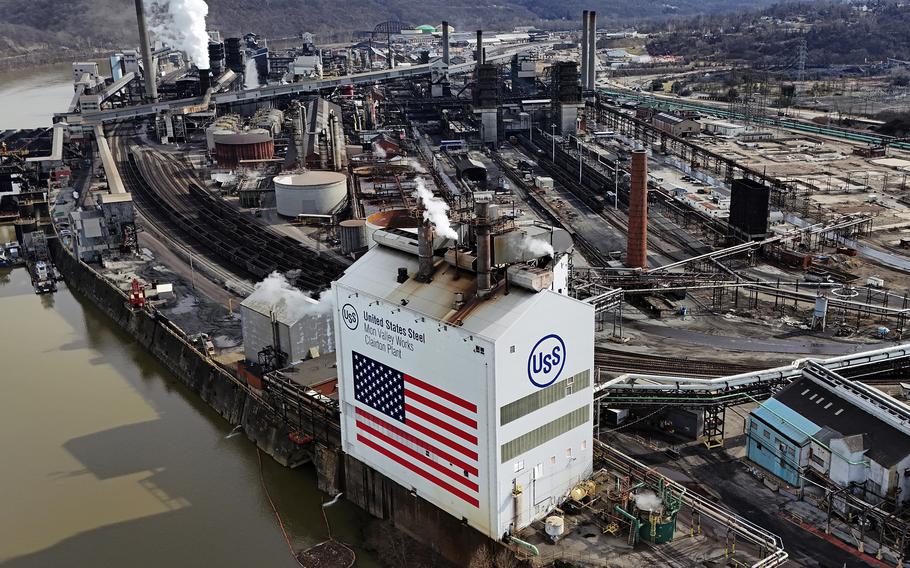
U.S. Steel’s Mon Valley Works Clairton Plant in Clairton, Pa., is shown on Monday, Feb. 26, 2024. (Gene J. Puskar/AP)
(Tribune News Service) — U.S. Steel workers have a new bid to win over President Donald Trump, and they’re making their case now.
Eschewing the slow, tumbling momentum that failed to win over President Joe Biden, the steelworkers drafted an open letter to Trump this week making it clear that they don’t want the iconic Pittsburgh company to sell to their competitor in Cleveland.
“Frankly, the way Cleveland-Cliffs CEO spoke about the Japanese people was offensive to so many people that I can’t imagine why anyone would want to work for that type of person or company,” the letter reads, making it clear that workers still favor a $14.9 billion pairing with Japan’s Nippon Steel that was nixed by President Biden in the final days of his presidency.
The comment was in response to a Jan. 13 press conference during which Cleveland-Cliffs CEO Lourenco Goncalves repeatedly described Japan as “evil” and said the country was directly responsible for threatening American steel jobs, among other disparaging comments.
The fresh campaign comes as U.S. Sen. Rand Paul became the latest prominent Republican to speak out against Mr. Biden’s Jan. 3 decision to block the deal over what he said was a threat to national security.
The White House, under Mr. Biden, then granted a six-month extension on enforcing the block, allowing for a legal case in Washington to play out. U.S. Steel and Nippon sued the government last week over what they said was a politicized review. In a separate lawsuit, U.S. Steel and Nippon accused Cleveland-Cliffs, its CEO Lourenco Goncalves and the United Steelworkers union of conspiring to block the deal.
Mr. Paul, the Kentucky senator, argued in an op-ed this week that the block would hurt U.S. Steel employees, force a lower sale price, and ultimately boost Chinese steel production.
“The workers closest to the problems, such as the rank-and-file laborers in Clairton Coke Works, understand the need for an infusion of cash to modernize their plant,” Mr. Paul wrote.
In the letter to Trump, workers argued that Cleveland Cliffs “doesn’t have the money or the know how to make U.S. Steel great again or to make the investments that Nippon has committed.”
“Nippon Steel’s commitments include at least $2.7 billion that will be dedicated to improving steel facilities that employ USW-represented workers like me. The committed upgrades will breathe new life into our assets and a certain future for thousands of union jobs across the United States.”
Trump overturned dozens of Biden’s executive orders in the first 24 hours of his presidency and put out an “America First” trade policy with an expected emphasis on tariffs. By Feb. 1, he plans to place a 25% tax on steel and other goods imported from Canada and Mexico.
Kevin Dempsey, president and CEO of the American Iron and Steel Institute trade group, said the president’s “reinvigorated trade policy agenda” will “tackle many of the issues that are priorities for the American steel industry” including unfair trade.
“We look forward to working with President Trump and members of the new administration to ensure the continued competitiveness of the American steel industry and to strengthen American manufacturing as a whole,” he said in a statement.
U.S. Steel declined to comment on the new proposals until they are formalized.
Mr. Goncalves, asked during the press briefing before Trump took office how the new tariffs would impact his business, said: “I’m a big boy. I bought Stelco knowing that Stelco is in Canada, and you know what? America First.”
U.S. Steel and Nippon are expected to use their pending court cases in Pittsburgh and Washington, D.C. to try to persuade President Trump to overturn Mr. Biden’s decision.
The steelmakers sued the Biden administration for politicizing the review process that ultimately led the Committee on Foreign Investment in the U.S. (CFIUS) to punt the decision to Mr. Biden. The administrative record tied to that review will soon be filed in the District of Columbia Court of Appeals, and Nippon is expected to file an opening brief Feb. 3.
President Biden publicly opposed the merger before a formal review of its risks, though he said his final decision stemmed from the fact that a government panel was unable to resolve all national security concerns.
Challenges to CFIUS are exceedingly rare, but legal experts and former CFIUS officials acknowledged the unique circumstances of this review.
“We are hopeful it gets done, whether through Trump or litigation,” said Bob Rudnik, 41, a steelworker at U.S. Steel Irvin Works. “Nobody else will or has the ability to offer the investments or 10-year guarantee that we were offered with Nippon.”
© 2025 the Pittsburgh Post-Gazette.
Visit www.post-gazette.com.
Distributed by Tribune Content Agency, LLC.